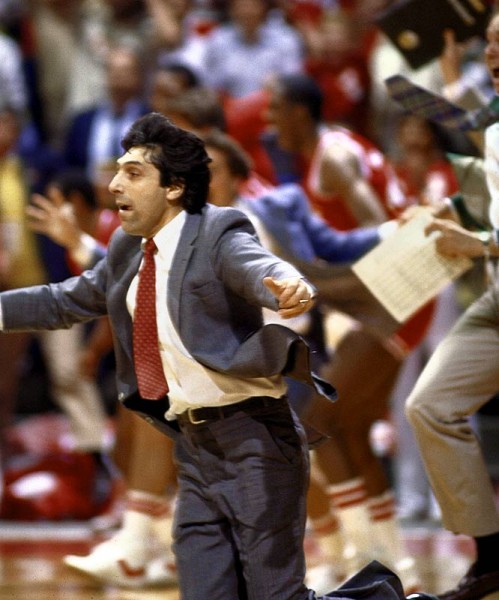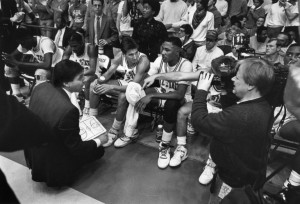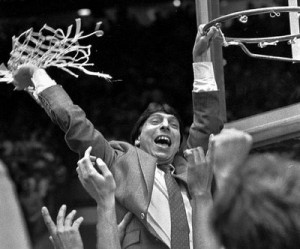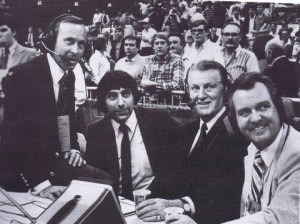Past Imperfect: The Wild Ride of Jimmy V
Posted by JWeill on December 8th, 2011Past Imperfect is a series focusing on the history of the game. Every two weeks, RTC contributor Joshua Lars Weill (@AgonicaBoss|Email) highlights some piece of historical arcana that may (or may not) be relevant to today’s college basketball landscape. This week: the ups and downs of famed coach Jim Valvano.
Few coaches in college basketball history have attained the sport’s highest levels of achievement and personal recognition. To do that, a coach must not only be dominant on the court, likely a national champion, but must also show both a sustaining level of that dominance and a personal magnetism that transcends on-court excellence. For those coaches who reach such lofty heights, there’s not much that a man can’t see within his grasp. Fortune and fame, even celebrity if so desired. A career choice originally based on a simple and single-minded goal – to be a major college head coach – can one day lead to possibilities never previously imagined: corporate pitchman, TV star, a brand unto oneself.
For James Thomas Anthony Valvano, the fame and attention he garnered for his team’s improbable victory in the 1983 NCAA title game was an elixir too potent to be sipped and appreciated. To the contrary, Valvano drank fully and became addicted: to the lifestyle, to the accolades, to the fame, to the next opportunity. For ‘Jimmy V,’ as he was known to most, there was, after years of toil in a cut-throat business, all of a sudden everything and anything possible. And Valvano, a boundless personality, a real talker, chomped at the bit to have it all.
The phrase “larger than life” gets used a lot, far too often on folks who simply aren’t. It’s as cliché as cliché comes, an almost meaningless term due to its over- and wrong-use. And yet, when applied correctly, it can be apt. Valvano certainly was someone it applied to. Despite losing his battle with cancer in 1993, Valvano is still very much alive. He lives on through the charitable foundation that bears his nickname, as well as the college basketball events that raise money for them. He lives on too in his much-revered and much-replayed speech at the 1993 ESPYs. You probably saw it recently, and you’ll see it again.
When you watched Jimmy V talk, he would often seem to be many people at once. And in some ways, he was. A championship coach and motivator, he was also loose with rules, uninhibited, conniving and at times downright crooked. The legacy he left at North Carolina State was mixed. On the one hand, he is forever entwined with one of the school’s greatest glories. On the other, it was under his watch that the program succumbed to sloth and avarice and imploded on itself, culminating in probation and Valvano’s own resignation.
The story of how a Queens-born scrapper became the biggest name in college hoops is a good one, a rags-to-riches tale of the kind Valvano was fond of regaling. It’s also a cautionary tale about attention to what’s right and what’s not, about over-reach and about making the tough choices.
The son of a high school coach, Valvano worked his way up through the coaching ranks after a playing stint at Rutgers in the late 1960s. After serving as an assistant at Rutgers for a year, he took the head coaching position at Johns Hopkins, leading the team to its first winning record in almost a quarter century, despite being just 22 years old. That job led to an assistant position at Connecticut, a thankless position in those days where hard work dwarfed prestige.
“Even then you knew he dreamed of Madison Square Garden and the bright lights. He wanted to go uptown and he wanted to go in a hurry. But in many ways he was just an Italian kid from the neighborhood,” said Dee Lowe, the man who’d hired him at UConn.
But Valvano was ever-enthusiastic and after two seasons in Storrs and three as the head coach at Bucknell, Jimmy V found his niche. It was at this stop, Iona, that Valvano began to make his mark, basking in the attention of the New York sports media, who loved his quips and panache.
Always a stellar recruiter, the loquacious Valvano built a winner in New Rochelle, culminating in a 29-win season and a second-round appearance in the NCAA Tournament. Valvano was hot, and with all five Iona starters graduating, Jimmy V took the next step up the ladder, accepting the head coaching position at North Carolina State, a basketball power on Tobacco Road.
Valvano knew that to compete with nearby North Carolina and Duke, he would have to raise his program’s profile, and he figured the best way to do that was to raise his own. Jimmy V canvassed the state and could be seen in advertisements, heard on local radio shows and seen speaking at functions across the state, his heavy New York accent and quick self-deprecating wit always entertaining and beguiling his audiences. As he said, “I set out very calculatedly to become known. The only thing I maybe miscalculated was how easy it would be.”
The barrage ultimately worked, and Valvano added both talent and confidence to his roster. Under Jimmy V, the Wolfpack started slowly but showed promise, finishing seventh in the ACC in 1981 and fourth in 1982, adding an NCAA appearance that season. With a strong and experienced lineup returning, expectations were high for 1983. When starting point guard Dereck Whittenburg injured his foot and missed major time, however, NC State managed just a fourth-place finish in the conference. Heading into the 1983 ACC Tournament, few expected State to receive consideration for an at-large bid, meaning the Wolfpack needed to win the tournament, and thus receive the automatic bid that accompanied it. That they did, overcoming North Carolina and Michael Jordan as well as Virginia and Ralph Sampson to earn a trip to the NCAAs.
Once in the bracket, the “Cardiac Pack” as they came to be known, managed a double-OT win over Pepperdine, a one-point defeat of UNLV, a win over Utah and a one-point victory over Virginia to reach the Final Four. After upending Georgia in the semifinals, Valvano and his team were one win away from capping one of the most improbable runs in college basketball history.
That championship game is considered among the greatest and most thrilling in the sport’s long annals. When Whittenburg’s last-second heave fell short but right into the hands of Lorenzo Charles, who dunked it home for the buzzer-beating win, chaos erupted, and Valvano was caught by the cameras memorably running around the court looking for someone to embrace.
That win, and the hoopla that surrounded it, catapulted Valvano into the coaching stratosphere. Instead of endorsing local soda brands or car dealerships – or rather, in addition to doing so – Valvano was now entertaining national media figures, hitting the talk show circuit, being feted by anyone and everyone. It was, in short, everything he’d ever wanted.
Valvano, his outsized personality and ego now fully formed and vindicated, ran with it. Top-ranked recruits were now interested, and he could reel them in. Valvano’s biggest fish was local product Chris Washburn, a mammoth big man with a noticeable lack of motivation. Washburn joined future pros Vinny Del Negro and Nate McMillan in that year’s recruiting class, and with them, Valvano had the pieces for another shot at the NCAA title.
In 1985 and ’86, the Wolfpack came close, managing consecutive Elite Eight finishes. Valvano kept up his act, talking and chuckling and backslapping and talking some more. In an era of high-profile coaches – John Thompson, Lou Carnesecca, Bob Knight, Rollie Massimino, to name but a few – Valvano was still the loudest and brashest.
Following the 1988 season, UCLA parted ways with its coach and Valvano, who had been close with John Wooden and coveted the exposure and proximity to celebrity that being the UCLA coach would bring, made a move for the job. But when financial and personal considerations made it impossible, Valvano and his wife returned to Raleigh. Little did they know that within two years, thoughts of the UCLA job or any coaching job would be far from their minds.
A writer named Peter Golenbock researched and published a book called Personal Fouls, which purported to show how ruthless, manipulating and vainglorious Valvano really was. Among the allegations in Golenbock’s book were that the coach and his staff willingly hid drug test results for his players, that grades were fixed and teachers pressured to keep players eligible, that money and cars were being provided to players, that the school circumvented academic requirements for star basketball players, and that Valvano had actually graduated only one player during his tenure. Even before the book’s release, early buzz helped force Valvano into resigning his position as Athletic Director.
While investigations by the NCAA and independent organizations never unearthed anything worse than the selling of sneakers and tickets, a violation of NCAA rules but short of the scandal portended by the rumor mill, additional allegations of point shaving and rampant player substance abuse caused heavy damage to his and the school’s image. “Obviously I had no knowledge of (the point shaving),” an uncharacteristically chastened Valvano said at the time. “If I had knowledge of it we would have reported that immediately and they would have been gonzo. I hope it’s not possible. I hope it did not occur.”
Washburn, it turned out, had indeed been admitted despite scoring a 470 on his SATs (the minimum for taking the test at the time was a 400). Washburn would later admit to drinking and smoking marijuana before games. It was also later revealed that, unbeknownst to Valvano, center Charles Shackleford had accepted $60,000 from a booster and an agent during his time in Raleigh, a clear violation of NCAA rules and another log on the growing fire under Valvano’s seat. While Valvano himself was never implicated, the Shackleford controversy continued a disturbing trend of a sincere lack of oversight by the coach and AD over his program. On April 7, 1990, with pressure from the school, Valvano stepped down as head coach.
The halls of coaching now seemingly closed to him, Valvano moved to the broadcast booth, where his penchant for talking and his coaching knowledge would serve him well. Almost immediately, he was one of ESPN’s top college broadcasters, and his back-slapping ways only endeared him more to the coaching fraternity that both pitied and loved him. Every so often, a coaching job would come up and his name would be mentioned — Wichita State one year, the New Jersey Nets another — but he never took the plunge. None were big enough for him, or, rather, right enough.
Jim Valvano was diagnosed with bone cancer on June 12, 1992, and given a year to live. That year, he cut a whole new figure for himself. Humbled but ever gregarious and brash, Valvano weathered his bout with disease with humor and passion, grace and a winning attitude. He succumbed to cancer on April 28, 1993, at the age of 47.
Nothing in Valvano’s coaching history suggests he was a malevolent person, nor that he sought to hurt anyone. What the known facts do suggest is that Valvano was complicated, a flawed human with an aggressive personality and a hunger for fame and its trappings. They also suggest that his enthusiasm for self-promotion eventually got in the way of his genuine coaching acumen and ability to teach. As history has shown, once that happens, disaster is rarely far behind.
Valvano was no saint, and he never claimed to be. He should be celebrated for his spirit in the face of adversity and his unwavering dedication to his friends and family. But his tale should also be told more often. It’s a tale that still resonates, as young coaches find themselves caught in moments of decision-making that could alter their futures and the futures of their players, programs and fans. Hopefully, they will be familiar with the story of Jim Valvano. After all, he’s never really left us.















































This is a pretty fair examination of V’s life, despite it really only scratching the surface.
I do think the author of this piece gave Peter Golenbock an unwarranted pass. The NCAA never found any major wrongdoings with the program, but further, a great many of the accusations in the book were proven false. Dates were wrong. Players’ names were misspelled. To say Golenbock “researched” for this book is a gross abuse of the word. He took the fabricated stories of a jilted ex-manager and ran with them without doing any due diligence to ensure the claims were accurate.
Ultimately, what did Golenbock care if his accusations were accurate? The wild, mostly false claims on the jacket cover were enough to sell plenty of copies, despite multiple publishing houses refusing to print the manuscript because they were dubious of Golenbock’s “research” (which proved to be wise moves on their part, in retrospect).
Like a football referee blowing a play dead on a fumble return for a touchdown, the damage Golenbock’s book inflicted couldn’t be undone. Now that V’s gone, the school and all the parties involved in his ouster can never make it right. It’s been NC State’s cross to bear for the last 20 years, and we’ve never recovered from it.
I don’t wish ill will on folks, but I would make exception for Peter Golenbock. He unjustly ended Valvano’s career with a fabricated hit piece, and I’m convinced the stress Valvano endured during that year ultimately led to him falling victim to cancer. The amount of stress he was under at the time was immeasurable.
What’s done is done.
I’m thankful the silver lining to this story is that the V Foundation has done great work in the realm of cancer research. How ironic would it be if Golenbock was treated for cancer made possible by the very funding the V Foundation provides? He would ultimately be saved by the very man he took down. I just wonder if Golenbock would be bright enough to realize it in the moment…